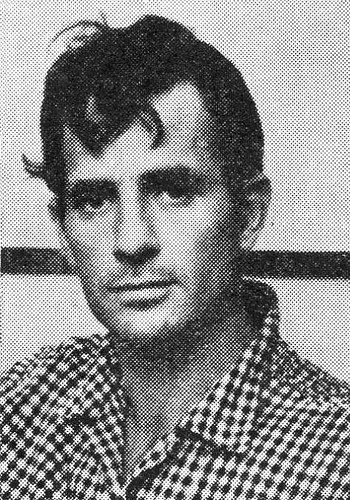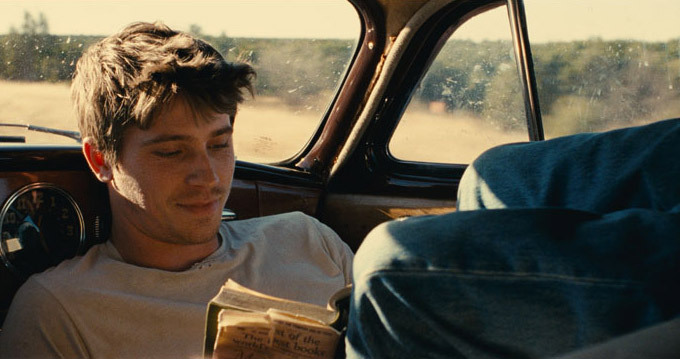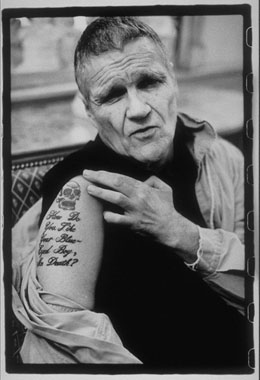Film Commentary: Visions of “On the Road,” the Movie
Jack Kerouac once said that On the Road “was really a story about 2 Catholic buddies roaming the country in search of God,” but the spiritual element of his journey is completely lacking in the film.
By Jay Atkinson
“The world you see is just a movie in your mind.” – Jack Kerouac, in a January 28, 1957 letter to ex-wife Edie Parker.
In 1956, photographer William Eichel visited San Francisco to take a portrait of Jack Kerouac and other Beat writers for a spread in Mademoiselle. Later, when Viking Press requested an image of the 35-year-old novelist for the dust jacket of his forthcoming book, On the Road, they cropped a silver crucifix which hung from a chain around Kerouac’s neck (as well as poets Allen Ginsburg and Gregory Corso) from the Eichel photo.
This sort of heavy handedness from his publishers irked Kerouac across his entire career. When his editors tried to blunt the “big, rushing tremendousness” of On the Road by shortening sentences and adding conventional punctuation, the Lowell, Mass. native called it a “typically American business idea like removing the vitamins out of rice to make it white (popular).” More than anything, Kerouac saw himself as a religious writer, a seeker. In a subsequent book, he wrote, “am actually not ‘beat’ but strange solitary crazy Catholic mystic.”
Kerouac’s Catholicism is just one of the elements that’ve been “cropped out,” so to speak, from a new film version of On the Road, directed by Walter Salles and written by Jose Rivera. At a recent preview of Salles’s film at Boston University, I was invited to deliver a few remarks and then sat among a large, anticipatory crowd of students. Based on Kerouac’s experiences in the late 1940s, On the Road is the author’s “big elaborate manuscript of the night,” with a lot of counter cultural weight behind it. Millions of readers have a particular vision for what Kerouac called “the visual American form,” or “Bookmovie.”
Salles’s new film is a beautiful object, with vintage cars zooming along two-lane roads and bebop music playing over the soundtrack. The jazz-fueled parties, featuring Garrett Hedlund’s portrayal of an ecstatic Dean Moriarty, accurately reflect the novel’s Benzedrine-soaked energy. But there are several dull stretches, where the woefully miscast Sam Riley (as writer-narrator Sal Paradise) and Kirsten Stewart (as Moriarty’s oversexed girlfriend, Marylou) give flat line readings and wander around, bored. Kerouac once said that On the Road “was really a story about 2 Catholic buddies roaming the country in search of God,” but the film completely lacks the spiritual element of his journey.
The movie’s director, Walter Salles, also made 2004’s The Motorcycle Diaries, which is about a Pan-American trip taken by the young Che Guevara, before his days as a communist revolutionary and capitalist brand name. A BU student who attended the preview of On the Road noted that Salles’s vision of North America wasn’t nearly as passionate as his depiction of South America in the earlier film. In the novel, Paradise buys a copy of Alain-Fournier’s novel Le Grand Meaulnes in anticipation of a cross-country bus ride but says he “preferred reading the American landscape as we went along.” Kerouac’s love of America, particularly the small town life he encountered along the way, is missing from Salles’s film, which instead focuses on the sexual politics and partying that are also part of the book.
A painstaking craftsman who never shook off his reputation as a free-swinging improviser, Kerouac struggled for almost a decade to conceptualize, write, revise (in whole drafts, including the famous “scroll” version of the book, written during an intense, three-week period in 1951) and eventually publish On the Road. Following Gilbert Millstein’s 1957 New York Times review calling On the Road “an authentic work of art,” Kerouac wrote to actor Marlon Brando, who was reportedly interested in playing the charismatic Moriarty, based on Kerouac’s friend, Neal Cassady. In his letter, Kerouac explained the religious dimension of his book, anticipating that it would be overlooked: “Everything I write I do in the spirit where I imagine myself an Angel returned to earth seeing it with sad eyes as it is.”
Brando never responded, and Kerouac, who was often broke, was not informed that Warner Brothers had offered $110,000 for the rights to On the Road. Kerouac’s agent, Sterling Lord, who still maintains his New York office, turned Warner Brothers down. Lord expected a bid of $150,000 from Paramount, with Brando slated to play Moriarty. Paramount’s offer did not materialize, and Kerouac failed to sell the movie rights during his lifetime. He died in Florida, in 1969 at age 47, with a few hundred dollars to his name.
In 1978, Francis Ford Coppola bought the rights to On the Road from Kerouac’s estate. But Coppola never found a script he liked, including drafts he wrote with his son, Roman. Michael Herr, author of the harrowing Vietnam War chronicle Dispatches and a contributing screenwriter for Coppola’s Apocalypse Now and Stanley Kubrick’s Full Metal Jacket, was hired to write a screenplay. Barry Gifford (Lost Highway) and novelist Russell Banks (The Sweet Hereafter) also wrote scripts that were discarded. Over the years, several actors, including Johnny Depp, Matthew McConaughy, Ethan Hawk, and Brad Pitt expressed interest in being cast in a film version (In 1957, Kerouac’s choice to play Sal Paradise was either himself or Frank Sinatra).
Any of these performers would’ve been an improvement over Riley, who looks half-asleep in the part. Hedlund is successful at revealing the melancholy aspects of Moriarty’s frenetic sexuality, and Viggo Mortensen has a brief but memorable turn as depraved patrician Old Bull Lee, aka William S. Burroughs. During pre-production, controversial Kerouac biographer Gerald Nicosia, who has feuded publicly with the writer’s estate, was part of a three-week “beatnik boot camp” for the actors. By the looks of it, several of them washed out.
Fans have long hoped that the movie version of On the Road would equal the intimacy and the breadth of Kerouac’s novel. Unfortunately, Salles’s effort won’t be joining the list of classic American road films that includes Dennis Hopper’s 1969 Easy Rider; The Searchers directed by John Ford in 1950; and Preston Sturges’s Sullivan’s Travels from 1941. The clothes look right. The music and cars are authentic. But the film lacks a pulse. As one BU freshman put it after watching the film, “They did what they could with it.”
Jay Atkinson is the author of seven books, including Paradise Road: Jack Kerouac’s Lost Highway and My Search for America. He teaches a course entitled “Jack Kerouac and the Beats” at Boston University and can be reached here.
Sidebar: Harry Crews and On the Road
Its not widely known that novelist Harry Crews was also offered a shot at writing a screenplay for On the Road. A two-fisted, Southern Gothic writer, Crews is the author of an acclaimed memoir, A Childhood: the Biography of a Place and several novels, including Car, A Feast of Snakes, The Gypsy’s Curse, The Knockout Artist, and Body. Several of his novels have been optioned for the screen, including The Hawk is Dying, which was made into a 2008 film starring Paul Giamatti. Crews also worked with actor/director Sean Penn on original screenplays, as well as adaptations of his own novels, and appeared briefly in Penn’s directorial debut, The Indian Runner.
No fan of Jack Kerouac, Crews was my mentor at the University of Florida and, ironically, cured me of writing in a Kerouac-inspired, spontaneous manner when I studied there. In another twist, I was making the last long trip, from St. Petersburg, Florida, where Kerouac died, to Lowell, Mass., where he was born, for my book, Paradise Road: Jack Kerouac’s Lost Highway and My Search for America, when I stopped in Gainesville to spend some time with Harry. It was the first time I’d seen him in many years, though we spoke fairly often on the telephone and exchanged letters.
During our visits, which spanned a few hours over two days, Harry told me that several years earlier Francis Ford Coppola had offered him a million dollars and a luxury coach and driver to retrace Kerouac’s journeys. Knowing the tortured history of the project, Crews turned down the offer, saying he’d rather spend his time writing another novel. Harry’s 20th and final book, An American Family: the Baby with the Curious Markings, was published in 2006. He died in Gainesville earlier this year, at age 76.
— JA
Tagged: Garrett Hedlund, Jack Kerouac, Kristen Stewart, On the Road, Sam Riley



